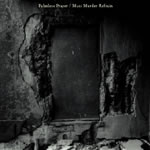|
|
 |
Dusted Reviews
Artist: Mono & World's End Girlfriend Album: Palmless Prayer / Mass Murder Refrain Label: Temporary Residence Review date: Oct. 1, 2006 |

|
|
|
 |
Characterizing the output of a post-rock band as "picturesque" or "expansive" or "idyllic" is no longer sufficient praise. Post-rock, in the sense we have come to use the term (as opposed to the way Simon Reynolds coined it in 1994), is by nature all of those things; the absence of more interesting descriptors tends to mean that the music in question is submissive and long-winded enough to encourage the listener's mind to wander. Post-rock denotes bands that play linear, wordless studies in dynamic and volume, and connotes that they sound like Mogwai and pre-exclamation point shift Godspeed You Black Emperor!, just as their contemporaries do.
Mono, not unlike Explosions in the Sky, came onto this scene as a band whose music was formulaic but genuinely exciting, making up in intensity and violence what it lacked in innovation. Their first two albums, Under the Pipal Tree and the formidably dark One Step More and You Die, tore through the guitar-epic canon with a sleek elegance, gliding smoothly between harmless twinkling and vicious, calligraphic noise. But gradually they subdued the squalls, became well-mannered to a fault; the string-lined mini-symphonies of this year's You Are There are nothing if not picturesque, expansive and idyllic, but they're not a great deal else.
Katsuhiko Maeda, as World's End Girlfriend, works in a moodier, more psychedelic vein, casting courtly strings and burbling electronics toward a sometimes-provocative hodgepodge of para-rock styles (sort of like the audibly Japanese equivalent of Norway's Shining). His more interesting explorations, like last year's The Lie Lay Land, share the noirish affinity with Mono's best work, though he articulates it with eerie patchworks of sound rather than with the quartet's thundering heft – claustrophobic to their expansive, insidious to their idyllic – but suffice it to say that the promise of the collaborative release Palmless Prayer / Mass Murder Refrain is self-evident, and that the cryptically melodramatic title makes a great deal of sense.
Start with the best piece: "Part 3" (of five), a swirling dirge of strings and shimmering guitar accented with piano and drums. A swoon of delay pedals – a trick Mono perfected after stealing it from Mogwai – begins to churn at about six minutes in; an electric guitar counterpoint comes in exactly at eight. All escalates and swells with light distortion for a suitable interval, then recedes for five minutes, finally clocking in at just over 17. It's quite pretty, and familiarly (if not uniquely) Mono, but in its complete linearity it feels simplistic and facile, almost scornful in how aptly it describes the post-rock everysong. It rises and falls, and takes a very long time to do so ("Part 5," slightly more triumphant, takes two minutes longer), and as expressive and hypnotic as it is, it offers even less to think about than You Are There.
The other parts of the record, for what it's worth, do not follow the rise-and-fall rubric; the irony is that they're hardly eventful enough to justify their length. "Part 1," a meditation in Godspeed's slithering slow-burn chamber strings, uses up its ideas in five minutes and waits out the next seven folding over itself in listless intertwinement; "Part 2" does the same, with more layering and less suspense. "Part 4" is a bit more interesting thanks to Maeda's fingerprints, stirring slow piano chords and ghostly voices over an increasingly tense string fringe, but ultimately it also peters out with nothing much to do, too willfully eerie for background music, too lead-footed for sustained interaction.
So Palmless Prayer doesn't live up to its promise – there was every reason to believe that these bands who overlap thematically and differ musically would apply Maeda's sense of intricacy to Mono's big-picture drama and produce something both shadowy and powerful. Instead, it emphatically reinforces the operative stereotypes about post-rock, taking the most conventional of Maeda's ideas and instrumentation and leaving them to wander about in Mono-sized spaces.
By Daniel Levin Becker
|







